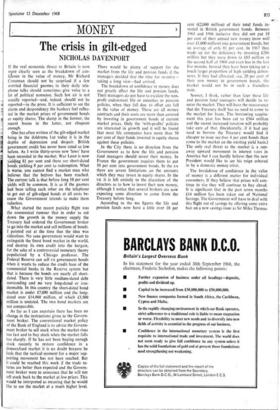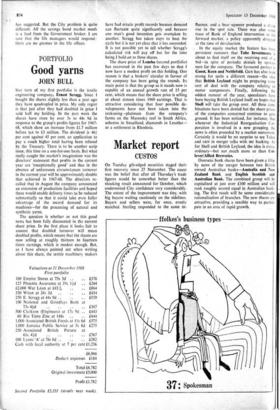The crisis in gilt-edged MONEY
NICHOLAS DAVENPORT
If the real economic threat to Britain is now more clearly seen as the breakdown of con- fidence in the value of money, Mr Richard Crossman should not be surprised if a few worried financial gnomes in their daily tele- phone talks should sometimes give voice to a lot of political nonsense. Such hot air is not usually reported—and, indeed, should not be reported—in the press. It is sufficient to see the alarm and despondency the bankers feel reflec- ted in the market prices of government bonds or equity shares. The slump in the former, the recent boom in the latter, are eloquent enough.
One has often written of the gilt-edged market being in the doldrums tut today it is in the depths of depression and despair. British government credit has never been rated so low before. As I write thirty-seven new 'lows' have been recorded in the market. War Loan is now yickling 8+ per cent and there are short-dated bonds yielding 8 per cent to redemption. What is worse, you cannot find a market man who believes that the bottom has been reached. The current talk is that before long 10 per cent yields will be common. It is as if the gnomes had been telling each other on the telephone to get out of gilt-edged bonds at all costs be- cause the Government intends to make them valueless.
,What started the recent panicky flight was the nonsensical rumour that in order to cut down the growth in the money supply the Treasury had ordered the Government broker to .go into the market and sell millions of bonds. I pointed out at the time that the idea was ridiculous. No sane government would want to extinguish the finest bond market in the world, and destroy its own credit into the bargain. for the sake of a controversial monetary theory popularised by a Chicago professor. The Federal Reserve can sell us government bonds when it wants to reduce the credit base of the commercial banks in the Reserve system but that is because the bonds are nearly all short- dated. There is very little medium-dated debt outstanding and no very long-dated or irre- deemable. In this country the short-dated bond market is under £7,000 million and the long- dated over £14,000 million, of which £3,500 million is undated. The two bond markets are not comparable.
As far as I can ascertain there has been no change in the instructions given to the Govern- ment broker. The conventional market policy of the Bank of England is to advise the Govern- ment broker to sell stock when the market rises too fast and to buy stock when the market falls too sharply. If he has not been buying enough stock recently to restore confidence in a demoralised market it is no doubt because he feels that the tactical moment for a major sup- porting movement has not been reached. But it could be reached this week if the trade re- turns are better than expected and the Govern- ment broker were to announce that he will not sell stock back to the market at low prices. This would be interpreted as meaning that he would like to see the market at a much higher level.
There would be plenty of support for the market from the life and pension funds if the managers decided that the time for re-entry— taking a long view—had arrived.
The breakdown of confidence in money does not greatly affect the life and pension funds. Their managers do not have to escalate the non- profit endowment life or annuities or pension policies, when they fall due, to offset any fall in the value of money. These are all money contracts and their costs are more than covered by investing in government bonds at current market prices. Only the 'with-profits' policies are interested in growth and it will be found that most life companies have more than 50 per cent of their funds invested in equity shares against these policies.
In the City there is no direction from the Government as to how the life and pension fund managers should invest their money. In France the government requires them to put 50 per cent into government bonds. In the us there are severe limitations on the amounts which they may invest in equity shares. In the UK it is left entirely to the discretion of the directors as to how to invest their new money, although I notice that several brokers are now expecting some direction to come from the Treasury before long.
According to the WA figures the life and pension funds now have a little over 18 per cent (moo million) of their total funds in- vested in British government bonds. Between 1963 and 1966 inclusive they did not put 18 per cent of their annual new money (now well over £1,000 million) into government bonds, but an average of only 8i per cent. In 1967 they made up for the deficiency by investing £286 million but they were down to £83 million in the second half of 1968 and even less in the last five months. Instead they have been taking up a much larger proportion of high yielding deben- tures. If they had allocated, say, 20 per cent of their new money to government bonds, the market would not be in such a friendless state.
Sooner, I think, rather than later these life and pension fund managers will decide to re- enter the market. They will have the reassurance that the Treasury itself has no need to come to the market for loans. The borrowing require- ment this year has been cut to £364 million and the recent increased taxation will probably take care of that. (Incidentally, if it had any need to borrow the Treasury would find it cheaper to issue tax-free 4 per cent bonds than come to the market on the existing yield basis.) The only real threat to the market is a run- away upward movement in interest rates in America but I can hardly believe that the new President would like to see his reign ushered in by a domestic money crisis.
The breakdown of confidence in the value of money is a different matter for individual consumers. If they believe that prices will con- tinue to rise they win continue to buy ahead. It is significant that in the past seven months £14 million has been taken out of National Savings. The Government will have to deal with this flight out of savings by offering some extra bait on a new savings issue as Sir Miles Thomas has suggested. But the City problem is quite different. All the savings bond market needs is a lead from the Government broker. I am sure that the life managers would respond : there are no gnomes in the life offices.















































 Previous page
Previous page